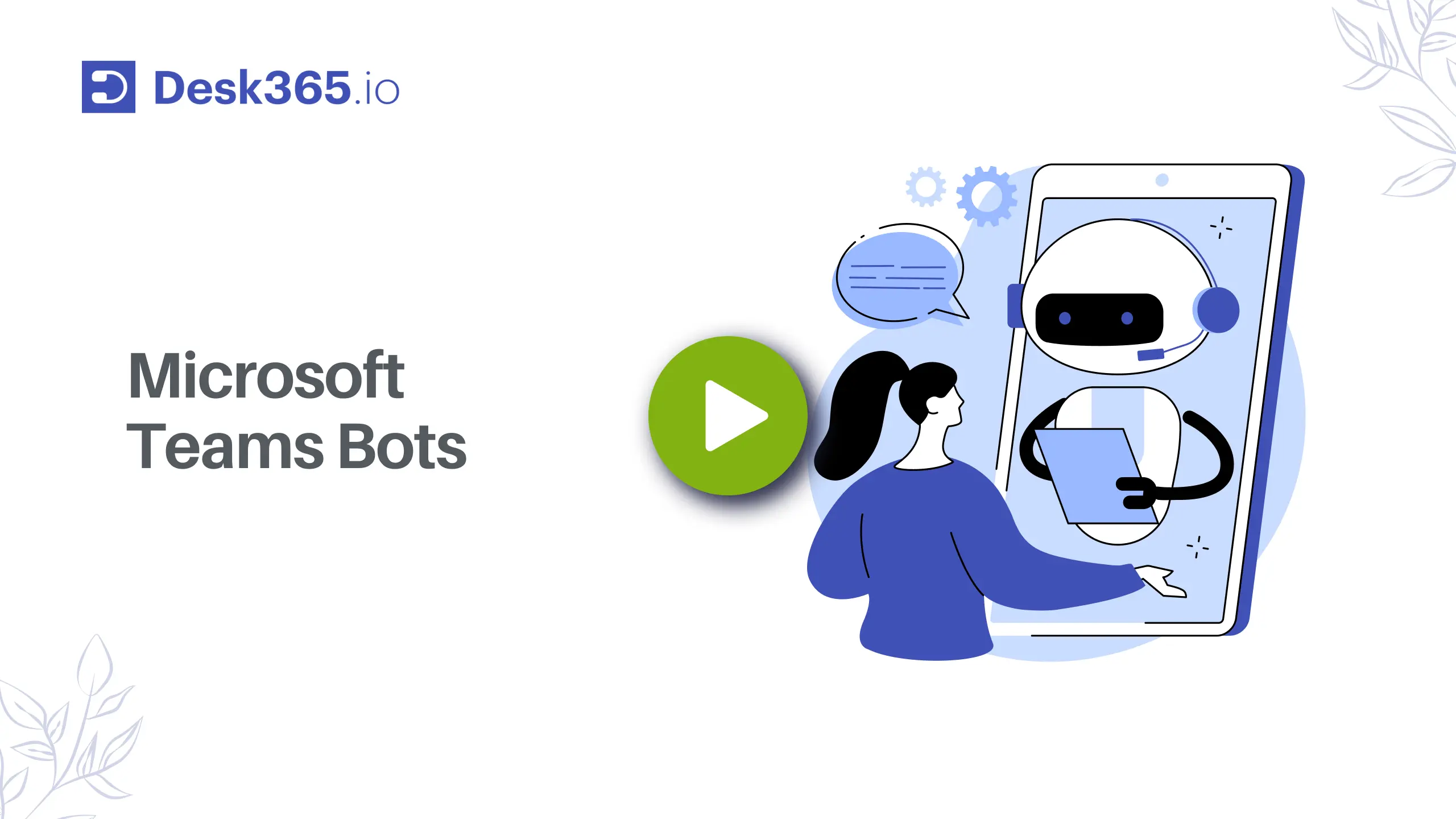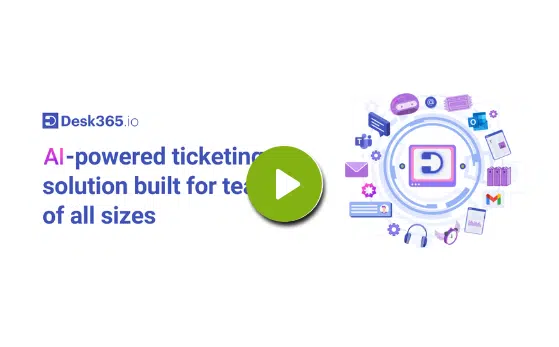In today’s competitive market, businesses are constantly on the lookout for tools that can improve their efficiency and customer service. One such tool gaining popularity is the open source ticketing system. However, is this the right solution for your business? In this blog post, we will explore the in and out of open source ticketing systems, their benefits, limitations, and highlight some of the top options available. By the end, you’ll have a clear understanding of whether an open source ticketing system is the right choice for you.
What is an open source ticketing system?
An open source ticketing system is a type of helpdesk software software that manages customer inquiries, often referred to as support tickets. What sets it apart is that its source code is openly available, meaning businesses can freely view, modify, and distribute the code. This flexibility allows organizations to customize the support ticket system according to their unique needs.
These systems enable support agents to manage tickets from multiple channels—such as email, chat, and social media—in one place. With features like ticket organization, prioritization, automation, etc., an open source ticketing system helps streamline customer support operations and resolve issues faster.
Recommended Reading: What is a Support Ticket? A Comprehensive Guide
Why use an open source ticketing system?
Open source ticketing systems offer a range of benefits that make them an attractive option for businesses of all sizes, especially those looking for a cost-effective and customizable solution.
1. Cost savings
One of the biggest advantages of an open source helpdesk system is that it is typically free or available at a much lower cost compared to proprietary systems. This makes it ideal for small and medium-sized businesses with limited budgets.
2. Customization
Because the source code is open, businesses can tailor the system to their specific needs. This level of flexibility is especially useful for organizations that require unique workflows, reporting, or integrations with other tools.
3. Community support
Many open source helpdesk systems have active communities of developers and users who continuously improve the software. These communities provide valuable support, fix bugs and release updates, more quickly.
4. Security
Having access to the source code allows businesses to identify and fix security issues themselves. This control can lead to a more secure and reliable system, as you are not dependent on a third-party vendor to address vulnerabilities.
5. Scalability
As your business grows, an open source helpdesk system can easily scale with it. You can add more users, handle more tickets, and expand the system’s functionality without worrying about additional licensing fees.
Benefits of using a free open source ticketing system
Free open source helpdesk systems bring significant advantages, particularly for businesses looking for affordable yet robust solutions. Here are some of the key benefits:
- Unlimited access: These systems often do not limit the number of users or tickets you can manage, making them highly cost-effective.
- Control over customization: With access to the source code, businesses have full control over how they customize the system to meet their unique needs.
- Continuous updates: Active open source communities ensure that the system is regularly updated and improved, providing new features and bug fixes. .
Limitations of an open source ticketing system
Despite their many benefits, open source ticketing systems do come with certain limitations. It’s important to understand these drawbacks before making a decision.
- Complex setup: Setting up an open source ticketing system can be time-consuming and technically challenging. It may require in-house IT experts or external consultants to configure the system according to your needs, which can increase costs.
- Lack of user-friendliness : Many open source helpdesk systems are designed with developers in mind, rather than end-users. This means that they might not be as intuitive or user-friendly as commercial alternatives, potentially making it harder for support agents to use efficiently.
- Additional costs: While the software itself may be free, businesses should expect to incur additional costs for hosting, customization, and maintenance. Training staff and ongoing enhancements could also add to the overall expense.
- Security concerns: Since the source code is openly available, there’s a risk that unauthorized users could access and exploit vulnerabilities in your system. Security must be a top priority when using an open source solution.
- Limited customer support: Unlike commercial helpdesk systems, open source options typically don’t come with dedicated customer support. You’ll need to rely on community forums, online documentation, and your own resources to troubleshoot any issues.
Top 5 open source ticketing systems
If you’re considering using an open source ticketing system, here are five of the best open source options available:
1. osTicket
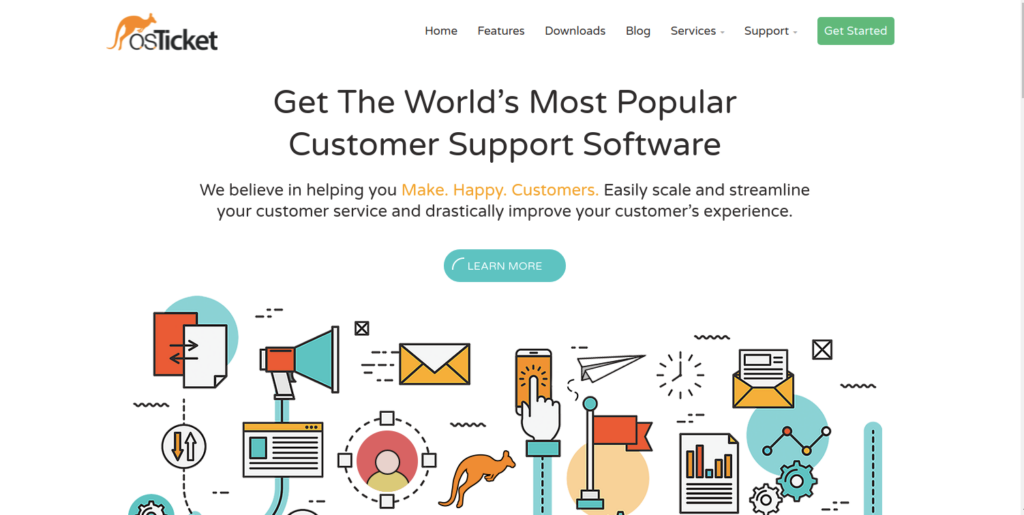
osTicket is a popular, simple-to-use helpdesk ticketing system. It offers features such as ticket routing, email integration, and a knowledge base. Its user-friendly interface and robust functionality make it suitable for businesses of all sizes.
Pros:
- Custom fields for collecting user data
- Efficient ticket routing and management
- Easy integration with multiple channels
Cons:
- Outdated user interface
- Difficult to locate tickets without their specific number
Recommended Reading: The Best osTicket Alternatives
2. Zammad
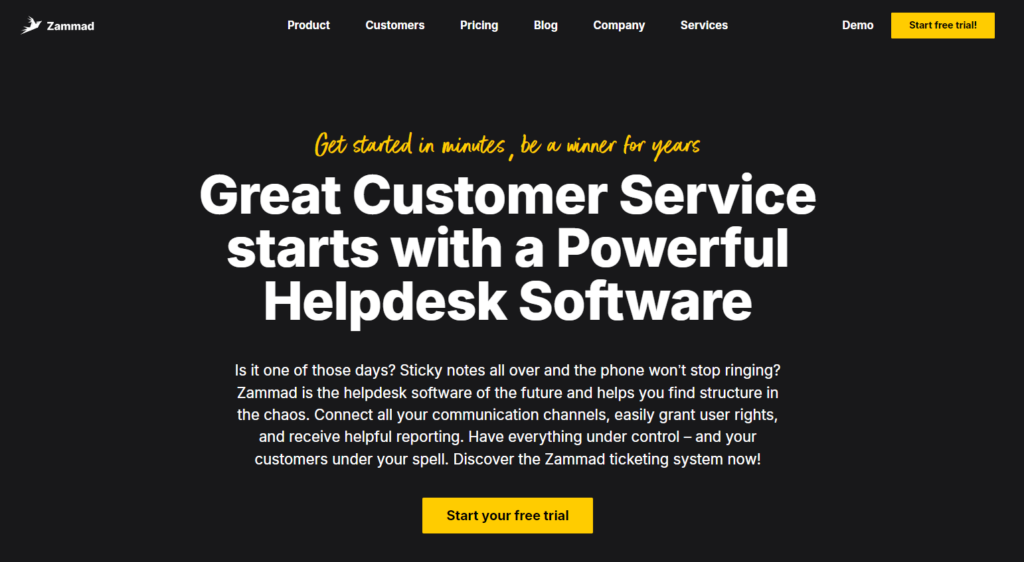
Zammad is a modern helpdesk system with a wide range of features like live chat, ticket management, and integration with social media. Its multilingual support and ease of use make it a great choice for businesses looking for a flexible solution.
Pros:
- Customizable dashboards for tracking ticket history
- Easy integration with GitHub and GitLab
Cons:
- Limited integrations
- The user interface can feel clunky
Recommended Reading: The Best Zammad Alternatives
3. FreeScout
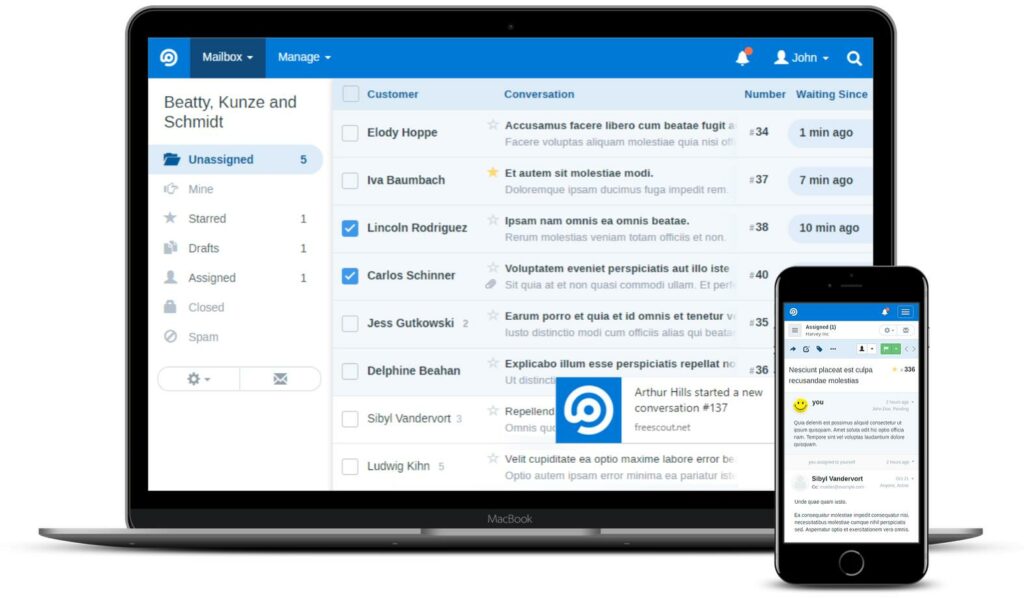
FreeScout is one of the best open source helpdesk. It is a lightweight helpdesk system built with PHP and MySQL. It offers features such as collision detection, real-time reporting, and mobile access.
Pros:
- Unlimited tickets, agents, and mailboxes
- Active community support
Cons:
- Complex deployment process
- Lacks some advanced features found in competitors
4. UVdesk
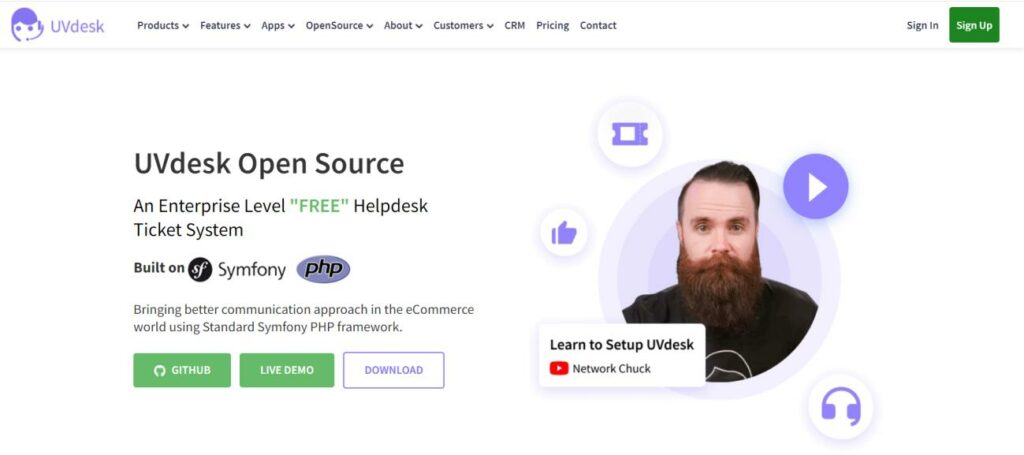
UVdesk is a feature-rich helpdesk system with support for ticket automation, user management, and eCommerce integration. Its multilingual capabilities make it ideal for businesses with a global reach.
Pros:
- Easy-to-use dashboard
- Workflow automation for faster ticket resolution
Cons:
- Initial setup can be challenging
- Limited integration options
5. Faveo
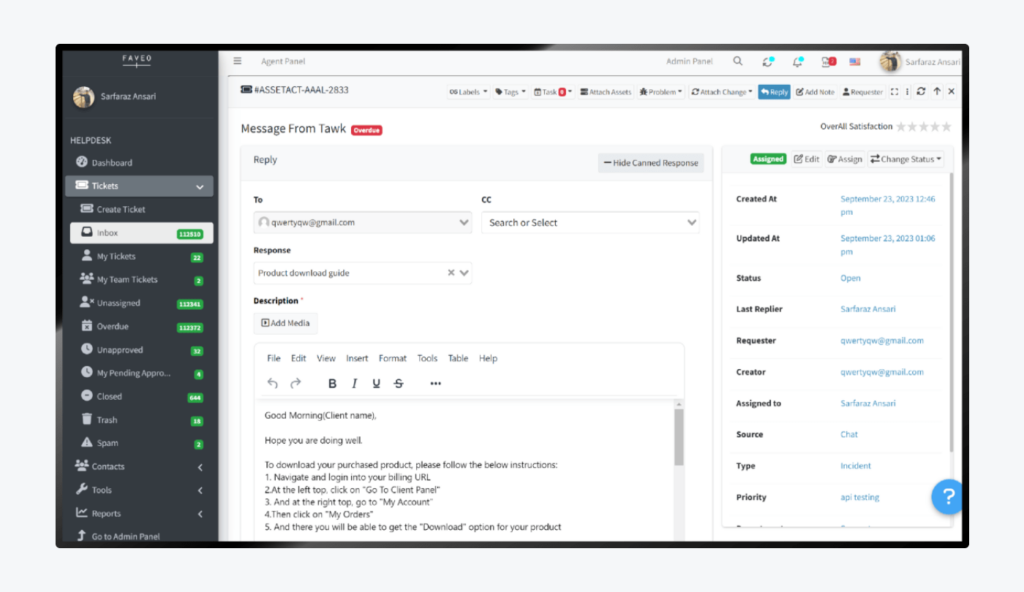
Pros:
- Customizable workflows and reporting
- Responsive support team
Cons:
- Slower updates
- Some features can be buggy upon release
Open source ticketing software offers a flexible, cost-effective solution for businesses looking to improve their customer support operations. However, they come with their own set of challenges, such as complex setups and limited support. By carefully weighing the benefits and limitations, and considering the top options available, you can determine whether an open source helpdesk ticketing system is the right fit for your business needs.
What makes helpdesk software a better option?
While open source support ticket systems offer flexibility and cost savings, businesses seeking a long-term, reliable customer support solution may find greater value in a dedicated helpdesk software like Desk365. These service desk platforms are designed with user experience, ease of use, and robust support features in mind. Let’s explore why helpdesk software may be a smarter investment for your business.
1. User-friendly and intuitive
Unlike open source helpdesk systems, which are often built from a developer’s perspective, helpdesk software is designed to be user-friendly and intuitive. They focus on making sure customer support teams can hit the ground running with minimal setup. The interface is designed to streamline ticket management and ensure your team can focus on resolving issues, not on figuring out how the system works.
Additionally, helpdesk solutions continuously test and update their features to ensure they run smoothly. You won’t have to worry about certain functionalities breaking down, as these platforms are maintained by dedicated development teams focused on improving your customer’s experience.
2. Quick and simple setup
Helpdesk systems like Desk365 can help you with quick and easy setup. You can get core features, like ticket management, automation, omnichannel support, etc., up and running right away. This means your support team can start improving customer service response times and ticket resolution without wasting time on complex configurations.
In contrast, open source systems often require significant time and effort to set up. If you opt for a free system, you’ll likely need to spend extra time configuring basic modules, troubleshooting, or hiring consultants to help. Helpdesk’s remove this hassle by offering a streamlined solution that works from day one.
3. Clear, predictable pricing
With paid helpdesk software, you know exactly what you’re paying for. Platforms like Desk365 offer transparent pricing plans, allowing businesses to choose the one that best fits their needs and budget. As your business grows, you can plan for future expenses, whether that means upgrading your plan or adding more features to accommodate a growing support team.
In contrast, open source systems often come with hidden costs. While the software itself may be free, additional expenses for hosting, customizations, plugin installations, and ongoing maintenance can quickly add up. Moreover, training your team on a more complex system may increase costs in the long run, leaving you with unexpected financial burdens.
4. Advanced features and innovation
One of the standout benefits of using a helpdesk software like Desk365 is access to cutting-edge features that help streamline operations and improve customer satisfaction. Desk365 offers advanced capabilities, such as Draft with AI, powered automations, knowledge base management, SLA tracking, and a lot more which allow your support team to work more efficiently and deliver faster responses.
Helpdesk platforms are continually updated with the latest advancements, ensuring that you stay competitive. With open source systems, you often have to wait for the community to develop and release new features, which could delay your ability to provide top-tier support.
5. Security
Security is a crucial factor when handling sensitive customer data, and helpdesk software like Desk365 takes this seriously. With built-in data security measures such as encryption, role-based access, and regular security audits, you can rest assured that your customer information is well-protected.
On the other hand, open source ticketing systems can pose a security risk. Because the source code is available to the public, it is more susceptible to attacks or breaches. While you may have control over the code, this also means you are responsible for identifying and fixing vulnerabilities—a potentially costly and time-consuming task.
6. Dedicated customer support
When you invest in a helpdesk solution, you also gain access to a dedicated support team which usually offers 24×7 email and phone support, ensuring that you always have help when you need it. Whether you encounter a technical issue or simply have a question, you can rely on professional support to resolve it quickly.
In contrast, open source systems typically lack dedicated support. You’ll need to rely on community forums, user guides, or online documentation, which might not offer the immediate assistance your team needs. This can lead to longer downtime and reduced efficiency when issues arise.
Recommended Reading: 15 Best Customer Service Software for Small Businesses in 2025
Industry use cases for helpdesk software with Desk365 solutions
Every business is different, and the customer support needs of various industries can vary greatly. Whether you’re in healthcare, education, retail, or human resource, helpdesk software like Desk365 can be customized to meet your specific needs.
Take a look at how Desk365 can help different industries improve their customer experience and overall operations.
Comparing open source ticketing system vs helpdesk software
Features
Open source ticketing system
Helpdesk software
Cost
Often free, but hidden costs for hosting, customization, and maintenance
Transparent pricing plans, with no hidden costs. You pay for the features you need
Setup & implementation
Time-consuming; requires technical expertise and customization
Quick and easy to set up; core features can be operational immediately
Customization
High customization possible but requires development knowledge
Customizable features without needing in-depth technical skills.
Security
Prone to vulnerabilities due to open source code availability
High-level data security with encryption and compliance with industry standards
Support
Limited to community forums and user guides; no dedicated support
Dedicated 24/7 support options available through email, phone, or chat
User-friendliness
Developer-focused; often less intuitive for end-users
User-friendly interfaces designed for easy navigation and use
Feature updates
Updates depend on community developers; they may be slow or infrequent
Regular feature updates with access to new innovations
Scalability
Can be scalable but requires additional resources and expertise
Scalable with easy addition of users and channels as the business grows
Integrations
Limited out-of-the-box integrations; requires manual configuration
Seamless integrations with third-party tools
Automation
Basic automation capabilities often require manual coding
Advanced automation for faster ticket resolution
Reporting & analytics
Limited reporting features; requires additional setup
Built-in advanced reporting and analytics for monitoring team performance and customer satisfaction
Omnichannel support
Varies depending on the tool; may not include all channels
Full omnichannel support, allowing management of all communications in one platform
Community & innovation
Supported by community developers but lacks guaranteed innovation
Continuous innovation with access to cutting-edge technology as part of the service
Long-term viability
Can become costly with additional customizations and maintenance
Predictable costs and easier to manage with dedicated support for long-term growth
Why Desk365 Outperforms Open-Source Helpdesk Solutions
Elevate your customer support with Desk365—offering unmatched reliability, security, and a full range of features to streamline your operations and enhance efficiency.
Open source ticketing systems offer a high level of flexibility and customization, which can be appealing to businesses looking for a tailored solution. However, this flexibility often comes with hidden costs that aren’t immediately obvious. Additionally, because the source code is publicly accessible, there are security risks involved, making your system more vulnerable to attacks. The complexity of setting up an open source system also requires technical expertise, which could slow down implementation and increase initial costs.
On the other hand, helpdesk software like Desk365 is designed to be user-friendly and easy to implement, allowing businesses to get up and run quickly without the need for technical knowledge. With Desk365, you benefit from robust security features, including encryption and compliance with industry standards, ensuring that your customer data remains safe. Plus, the helpdesk comes with dedicated support, so if you encounter any issues, expert assistance is always available.
Desk365 also offers advanced features such as Draft with AI, powerful automations, SLAs, seamless omnichannel support, real-time reporting, and a lot more making it a scalable solution that can grow with your business. Whether you are a small business or an enterprise, Desk365 provides the flexibility to customize the platform to meet your specific needs without the complexity or risk associated with open source systems.
If you’re seeking a cost-effective, intuitive, and secure ticketing solution that’s easy to customize and offers strong long-term support, Desk365 is an excellent choice. You can experience all these benefits by starting a 21-day free trial to see how it can improve your customer support operations.
Frequently asked questions
Some of the best open source ticketing systems include osTicket, Zammad, FreeScout, UVdesk, and Faveo, each offering unique features to suit different needs.
No, Google does not offer a dedicated ticketing system. However, many helpdesk platforms integrate seamlessly with Google Workspace for streamlined operations.
Open source ticketing systems offer cost savings, customization, community support, and scalability for businesses looking for flexible solutions.
Desk365 offers a user-friendly interface, robust security, advanced features, and dedicated 24/7 support, making it a reliable, scalable, and long-term solution.





